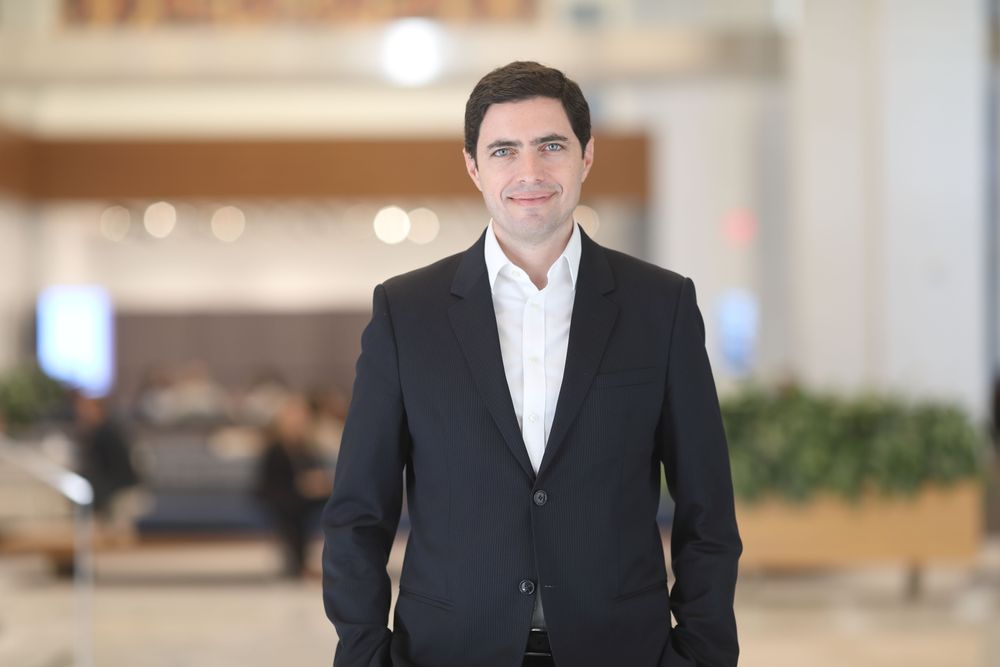Dear reader,
Welcome to the latest edition of The Forum File. In this edition, we are highlighting our firms’ work to remove barriers for historically underserved populations and expand access to banking services across the country to create a more inclusive economy.
We hope you enjoy reading this edition and please do not hesitate to share your feedback.
Kevin Fromer, President and CEO, Financial Services Forum
Penny For Your Thoughts
Gonzalo Luchetti, CEO of U.S. Personal Banking at Citi
What is Citi doing to remove some of the barriers preventing low-income Americans from engaging in the financial system?
This Summer, Citi bolstered our track record for leading on overdraft policy by completely eliminating all overdraft fees and returned item fees for our consumer banking customers. We already had some of the lowest overdraft fee revenues in relation to our size in the industry as a result of being a consistent leader in implementing overdraft practices to protect our clients. For example, we do not authorize ATM or point-of-sale debit transactions in cases when we know the money is not available and offer account packages like our industry-leading Access Account Package which provides automatic protection against overdrafts.
We also made a significant enhancement to our direct deposit policies, recognizing peer-to-peer (P2P) payments as direct deposits that enable customers to qualify for checking account monthly service fee waivers. This change will offer workers in the gig economy critical savings as they manage their monthly finances and we will continue to explore additional ways we can make our banking products even more accessible and affordable for our customers.
How is Citi helping expand financial access in areas where you don’t have a branch network?
Through the Citi Community ATM Network, we provide nearly 622,000 customers of 31 participating Minority Depository banks and Community Development credit unions with access to about 2,200 Citibank ATMs to make cash withdrawals free, removing a barrier to financial access that disproportionately impacts low-income Americans. Additionally, our Affordable Access to Banking Initiative enables participating community partners the opportunity to offer our Bank On certified Citi Access Account Package, with Citi waiving monthly service fees and minimum balance requirements, to participants regardless of geographic location. We currently have partners such as the National Urban League and Local Initiatives Support Corporation, with more partners in the pipeline.
Access to credit is a fundamental consumer need that has to be addressed in order to bridge the wealth gap. We are starting to build the onramps for consumers to feel well informed and credit ready through a credit education pilot that we are offering in partnership with a Community Development Financial Institution and Experian, to support their consumers, including minority business owners, and help consumers feel equipped to make the right credit decisions for themselves. We also continue to participate and lead in initiatives like the OCC-led Roundtable for Economic Access and Change (Project REACh) focused on extending credit to consumers with limited or no credit histories, again eliminating a key barrier for lower-income Americans as they look to enter the financial system and build wealth.
What is the longer-term vision for building on the progress you’ve made so far?
Through the launch of a Special Purpose Credit Program (SPCP), Citi will further our support for borrowers in majority Black and Hispanic census tracts. We will help these borrowers both within and outside our branch footprint, to obtain affordable mortgage loans by permitting low-down payments, removing mortgage insurance requirements and expanding lender-paid assistance programs. Citi is also finalizing a Small Business SPCP (Q1 2023) for a pilot (REACh), which will support lending to women, minority and veteran-owned Businesses in the Los Angeles Metropolitan Area with plans to scale in the future.
We know our work is not done. We have built a dedicated team to drive an integrated strategy for Financial Inclusion and Racial Equity within our U.S. Personal Banking business, helping us continue to enhance our services and products, and build new partnerships across the country to increase access and promote financial inclusion and racial equity for everybody.
Value Add

Over the last two years, gig workers represented about 35% of the U.S. workforce, with more than $1.4 trillion in payments – 40% of which were processed through PayPal. Often, though, these payments aren’t recognized as employment-related direct deposits, preventing these workers from taking advantage of accounts that waive certain fees with direct deposit enabled.
In July, Citi became the first major bank to recognize these peer-to-peer payments from employers as direct deposits, waiving monthly service fees for the Citi Access and Basic banking accounts when customers receive these P2P payments using the ACH platform in Cash App, Google Pay, PayPal, Pop Money, Venmo and Zelle.
These changes give workers in the gig economy critical savings as they manage their monthly finances. They also show the spirit with which we are embracing the opportunity to adapt to changes in how our customers manage their lives, while promoting access and inclusion in the financial system for low-income workers in the U.S.
Capital Gains
What we’re doing in Washington
The Forum announced the selection of Tiffany Haas as Head of Government Affairs. Haas has served as the Forum’s Co-Head of Government Affairs since September 2018. “I am delighted to announce Tiffany’s selection to lead our government affairs work,” Forum President and CEO Kevin Fromer said. “Tiffany has been an essential member of the Forum team for the past four years, serving our organization and its members with the utmost level of skill, professionalism, and dedication. She is a tremendous colleague, and I know she will excel in this new role.”
The Forum announced that Chip Bartlett has joined the organization as Vice President of Government Affairs. “Chip has a wealth of financial policy knowledge and experience gleaned from work in the public and private sectors,” Forum President and CEO Kevin Fromer said. “We are thrilled for him to join the Forum team and for him to represent the nation’s largest banks in Washington.” Bartlett previously focused on financial legislative and regulatory priorities while serving as the Vice President of Congressional Affairs at the Consumer Bankers Association and Vice President of Congressional Relations at the Independent Community Bankers of America.
Forum President and CEO Kevin Fromer highlighted some of the key themes from the inaugural Financial Services Forum Summit to keep in mind as Washington heads into a busy Fall. The Summit featured discussions from industry leaders, policy experts, and government officials. Main themes that emerged from the event include the resilience of the banking sector, the need to address unanswered questions related to large bank regulation in the near term, the importance of coordination and a broad government strategy in addressing climate change, and the necessity of regulatory clarity in the digital assets space. Click here to see key moments and full recordings of each panel.
Our Two Cents
Research from the Forum
The BankNotes Blog Spotlighted:
- The need to move forward on supplementary leverage ratio reform to ensure it plays a role as a backstop without unnecessarily restricting credit to any sector of the economy.
- The robust capital and liquidity levels of Forum members and the implications of current capital levels for current and future economic growth.
Checking the Balance
Members in the news
Atrium Health announced a $10 million gift from Bank of America to establish “Meaningful Medicine,” a program uniting the best innovations within health care, social impact and workforce development to directly target health equity and economic mobility goals within Charlotte. Meaningful Medicine will launch by implementing Atrium Health Levine Children’s school-based virtual care in 20 elementary Charlotte-Mecklenburg Schools during the 2022-23 school year. Within three years, the program will expand to offer virtual care at 50 CMS schools and behavioral health telemedicine at 31 schools.
BNY Mellon announced its role as a founding member of the Economic Opportunity Coalition, an initiative led by the Biden-Harris Administration to catalyze and align public and private investments that will address economic disparities and accelerate economic opportunity in underserved communities. The announcement is the latest example of BNY Mellon’s commitment to helping underserved communities and responding to some of today’s greatest challenges, including racial inequality and climate change.
In a recent report, Citi’s Global Chief Economist Nathan Sheets and Global Head of Trade Chris Cox examined the topic dominating trade talk: how supply chains are shifting as the world reacts to the new realities resulting from the pandemic and the war in Ukraine.
Goldman Sachs announced 50 recipients of the Black Women Impact grants program, part of its One Million Black Women initiative, to fund Black women-led and Black women-serving nonprofits. The 50 organizations were selected based on their established efforts to deliver innovative and transformative solutions to narrow opportunity gaps faced by Black women. A total of $10 million will be invested through the multi-year program.
JPMorgan Chase announced an expanded five-year, $30 million commitment to the financial and career success of students at Historically Black Colleges and Universities. This commitment expands on the firm’s Advancing Black Pathways initiative, which launched in 2019 to chart clearer pathways toward economic success and empowerment within the Black community.
Morgan Stanley welcomed its initial class of interns who were selected to be a part of the Future Generation Scholarship program. The scholarship provides tuition assistance and career-development support for students who are from ethnic minority and/or socially mobile backgrounds. The Future Generation Scholarship Program is one in a series of diversity initiatives championed and funded by Morgan Stanley’s Institute for Inclusion, which was established in November 2020 to support underserved communities and drive workplace diversity and inclusion, among other equality-driven goals.
State Street partnered with four Latinx-owned firms to underwrite $750 million of senior notes. This issuance demonstrates State Street’s ongoing and strong commitment to increasing Latinx representation and opportunities across the industry, and is the third such offering this year where the underwriting syndicate has been structured to amplify the firm’s inclusion, diversity and equity strategy.
Wells Fargo announced Growing Diverse Housing Developers, a $40 million grant initiative focused on expanding the growth and success of real estate developers of color, including Black- and Latino-owned firms, as well as increasing the supply of affordable homes across the country.
